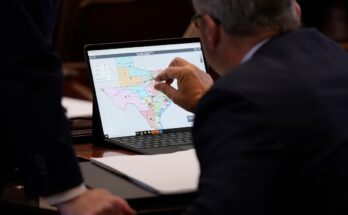The lack of progress in the great challenges of the present makes it difficult to glimpse the future and establishes a continuous present. The distrust with which citizens view institutions, intermediary agents and themselves leaves a lonely and isolated individual in a sort of helplessness who feels infinitely small in the face of great challenges, including the environmental crisis.
COP30 is currently being held in Belém, an event destined to be decisive or remain irrelevant. The geopolitical difficulties are known: the United States is withdrawing, denialism is on the rise and the European Union is hesitant and far from the leadership it exercised years ago. Everyone is looking to emerging countries and in particular to China, which could become the leader of the transition and with it of the new economy.
Despite all this, there are still forces working for greater ambition in the face of the environmental crisis. One of these, no less, is that of investors, aware of the enormous opportunities offered by the green economy, which has renewable energy as its great driving force. Another, the one that represents the test. Not so much the scientific one, even if it accumulates data and reports at an accelerated pace, but the experiential one. More and more people are affected by heat waves, sixth-generation wildfires, deadly damage, devastating hurricanes and devastating droughts that have become particularly extreme and recurring due to the climate crisis. According to World Bank studies, 1.2 billion people are at high risk of suffering the consequences of the climate crisis. The UNHCR highlights that between 2008 and 2022 the annual average of migrants and displaced people due to the effects of climate change was 24.5 million, rising to 32 million in 2022, and Germanwatch, in its 2025 study, estimates the damage caused by climate change between 1995 and 2024 at 4.5 trillion dollars.
Experiencing the consequences of the climate crisis not only affects the conscience of those who experience it, but also relocates the debate. For decades, conversations calling for us to act more in line with the planet have called for our daughters’ lives, for our sons’ daughters to think. It was about making sacrifices in the present so that subsequent generations would live better, or even be able to live. This posed a challenge for all political systems, and especially for democracies, as it was necessary to make an intergenerational commitment that required facing costs in the present for future benefit. An option that reduced the incentives for action by public officials to a minimum, because they were committed and responsible for the short period of their mandate. This is what their voters voted for and in that time they made their plans. Incorporating the future was politically sensitive.
All this has changed. Today, considering sustainability as an issue for the future means ignoring that this future has already arrived and that the measures to be taken are urgent, that it is no longer about our children, but about ourselves, and that what is done today can benefit or harm us personally. In other words, and despite containing a terrible reality, short-termism is no longer a problem in climate matters. Making excuses for the shortcomings of long-term policies no longer works. Lula da Silva expressed himself as follows at the opening of the COP: “Climate change is not a threat for the future, but a tragedy of the present”.
At an environmental level, two types of policies can be distinguished. The first, called mitigation, aim to eliminate the causes of the crisis, fundamentally to reduce greenhouse gas emissions. They also include a large part of the anti-pollution measures which, although they are different issues, end up converging in their consequences. The second is adaptation policies, aimed at adapting our way of life, our territories and our economy to the new climate reality. As stated by the professor and director of the Institute of Environmental Hydraulics of Cantabria, Íñigo Losada, scientific coordinator of the recent study Assessment of risks and impacts arising from climate change in Spain (ERICC-2025), “Adaptation must address the consequences of insufficient mitigation. Mitigation helps us buy time to implement adaptation and reduce its intensity.” They are, therefore, two sides of the same coin.
Adaptation policies are characterized by the need for immediate actions and their effects are felt in the short term. They range from urban planning that promotes cool, shaded areas in cities to make heat waves more bearable, to changes in the management of agricultural land to make it more resistant to damage, to rethinking defenses in the Cantabrian Sea to adapt to new storms and rising seas, to strengthening the public health system in times of high temperatures to cope with increased healthcare, or revising the school calendar to prevent children from spending hours cooped up in temperatures inadequate, among others.
Adapting cropping systems to make them more resilient in the coming days also includes reducing pesticide pollution, increasing carbon storage capacity and protecting biodiversity. Properly insulating buildings to better protect them from extreme heat and cold means saving energy which translates into money and fewer greenhouse gas emissions. Pedestrianization or traffic calming in cities and the increase of green areas reduce pollution and noise, avoid greenhouse gas emissions and improve air quality, while offering climate refuges. Each of these examples contains enormous complexity and multiple interdependencies between the different aspects that sustainability entails, but they all have in common that they involve acting with the present in mind, and the positive effects are immediately visible and are in turn projected into the future.
All this does not mean that long-term policies should be eliminated, because in the same way that today we suffer the consequences of greenhouse gases emitted decades ago, those emitted today will have repercussions on subsequent generations, so yes: we must look to the long term and be ambitious. But the legitimation of long-term policies today can be found in the effects we already suffer, in the continuous present in which we are installed.
Bringing environmental policies to the present is a necessity to explain how the environmental crisis affects our daily lives, and at the same time an opportunity to legitimize and make the necessary changes more understandable. The key to success will be finding a way to make this transition so that it is not a sacrifice, but an opportunity. This has been understood by farmers who have incorporated agroecology criteria and seen how their fields are more profitable, citizens who have rehabilitated their homes and seen how they gain in comfort and save on energy bills, or countries who have reduced pollution by investing in public transport and the electrification of mobility. There is no shortage of examples. If the keys are found to make them an opportunity, environmental policies will advance. Otherwise, they fuel the fertile ground from which deniers and the far right thrive.



